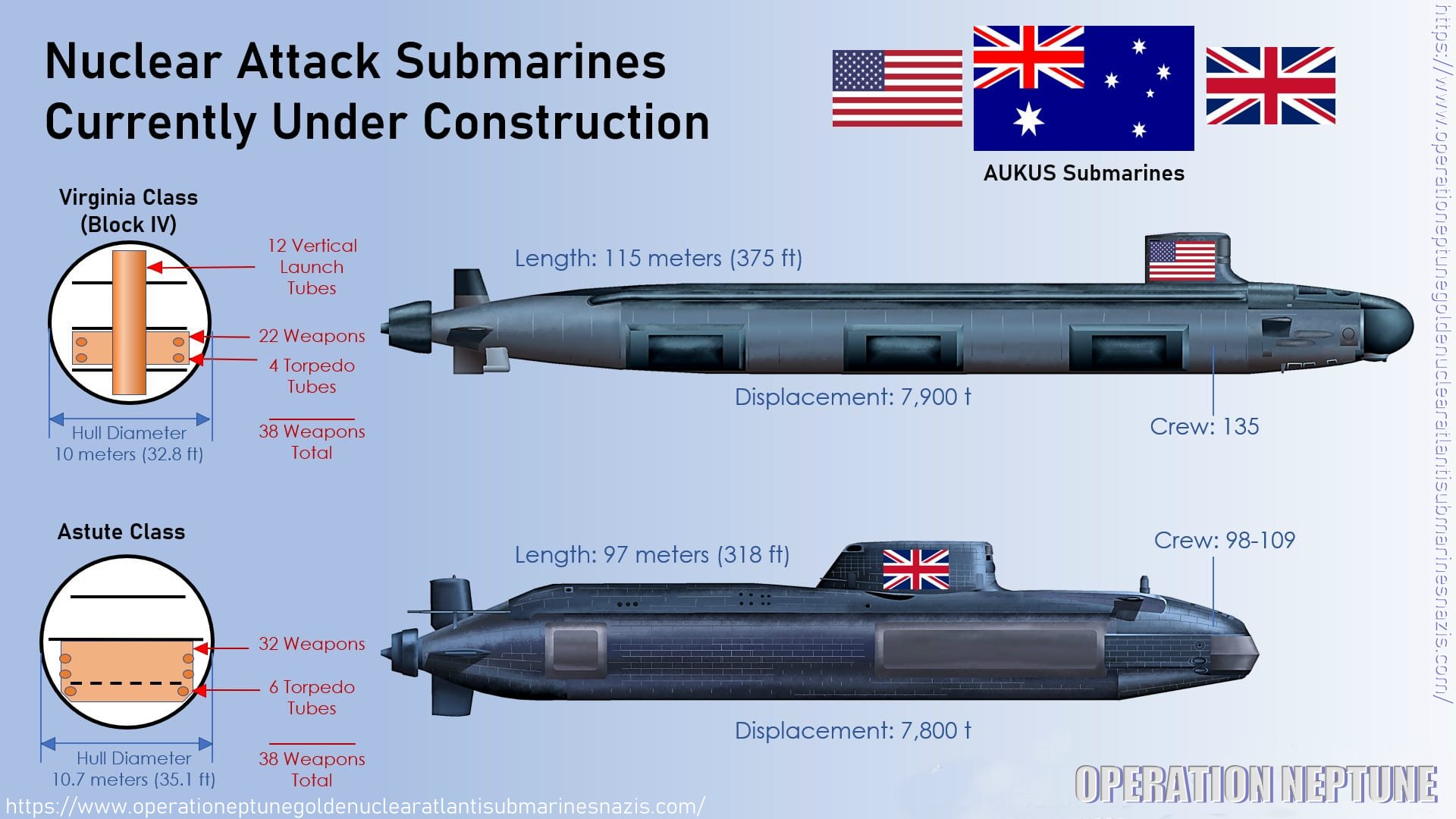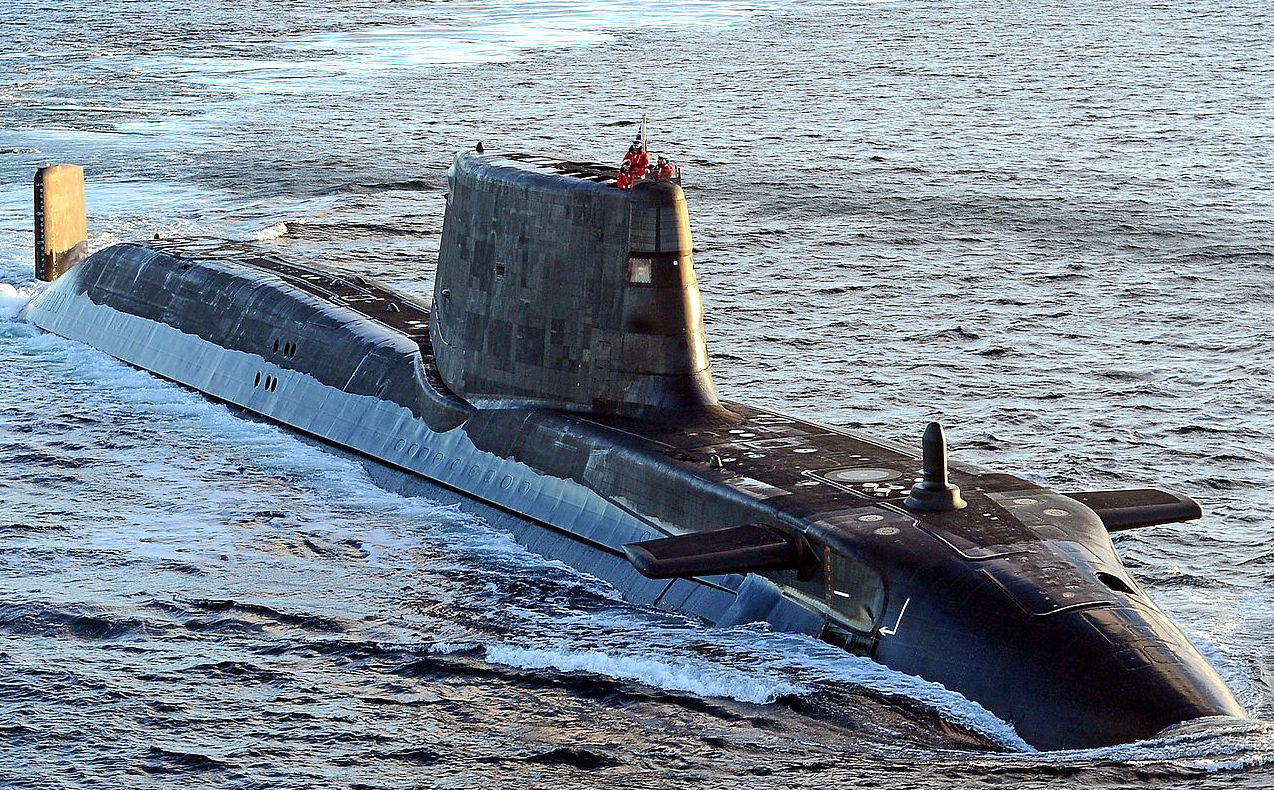|
AUKUS - TRILATERAL
PACT
ATLANTIS
STORY
MAP &
OPERATION HOMEPAGE

AUKUS, also styled as Aukus, is a trilateral security pact between Australia, the United Kingdom, and the United States, announced on 15 September 2021 for the
Indo-Pacific region. Under the pact, the US and the UK will assist Australia in acquiring nuclear-powered submarines.
The pact also includes cooperation on advanced cyber mechanisms,
artificial intelligence and autonomy, quantum technologies, undersea capabilities, hypersonic and counter-hypersonic, electronic warfare, innovation and information sharing. The pact will focus on military capability, separating it from the Five Eyes intelligence-sharing alliance that also includes New Zealand and Canada.
The International Centre for Defence and Security called the pact "a powerful statement about the priority of the Indo-Pacific" and as a statement "that the larger institutional groupings aren’t acting with the common purpose and speed that the current strategic and technological environment demands".
The US Ambassador to Australia, Caroline Kennedy, called the pact a "greater and deeper partnership" between the countries and said that it would provide a "lot of deterrence" in the
Indo-Pacific. The government of the People's Republic of China (PRC) was vocal in its contempt of the pact, accusing the three western countries of having a "cold-war mentality", as the pact was widely seen as being, at least in part, a response to China's status as an increasingly assertive emerging
superpower, allied to friendly (ish) relations with Russian.
Which of course it is and has courted on the international
stage, hence, was/is the engine of the Pact.
The
first law of physics and defence being the same: "For
every action there is an equal and opposite reaction."
The creation of the pact spelled the end of a French–Australian submarine deal. On 17 September 2021, France, which is an ally of the three countries, recalled its ambassadors from Australia and the US; French foreign minister Jean-Yves Le Drian called the pact a "stab in the back" following Australia's cancellation of the deal worth €56 billion (A$90 billion) without notice, ending recent efforts to develop a deeper strategic partnership between France and Australia.
Assuming that also means Europe and Australia. Crazy, because
Europe needs the protection of the UK and US, as was proven
during World
War Two. Australian forces adding considerably to the melee.
But the French reaction was hardly a surprise, given Brexit,
and subsequent hostility to the British, following withdrawal
from the EU. And France, unlike Germany, is committed to
finding uses for military nuclear fuel, such as their electricity
programme, shunned by many - and yet with the UK now courting
EON, in that department.
NUCLEAR POWERED SUBMARINES
Under the pact, the US will share nuclear propulsion technology with Australia the same as it has with the UK since 1958 under the US–UK Mutual Defence Agreement as will the UK. The Royal Australian Navy will acquire at least eight nuclear-powered submarines armed with conventional weapons to be built in Australia. The basic design and key technologies will be decided by the Nuclear-Powered Submarine Task Force an 18-month Department of Defence research project headed by Vice Admiral Jonathan Mead, begun in September 2021 with assistance from the US and UK.
Australia will extend the life of its Collins-class submarines that the Attack class was due to replace and may consider leasing or buying nuclear-powered submarines from the US or the UK in the interim until the delivery of its future nuclear powered submarines. Also in the interim, Australian Defence Minister Peter Dutton said that Australia will have regular visits by US and UK nuclear-powered submarines. The annual Australia-US Ministerial Consultations (AUSMIN) between the Australian Ministers for Foreign Affairs and Defence and the US Secretaries of State and Defense held in September 2021 endorsed "increasing logistics and sustainment capabilities of U.S. surface and subsurface vessels in Australia."
Australia considered purchasing French nuclear submarines which use nuclear reactors fuelled by low-enriched uranium at less than 6%. However, French reactor designs have to be refuelled every ten years, and Australia does not have a civil nuclear capability with nuclear energy prohibited. In contrast, American and British designs power the submarines for the expected life of the submarines using nuclear reactors fuelled by highly enriched uranium (HEU) at 93% enrichment.
Currently, only six countries have nuclear submarines, the five permanent members of the UN Security Council
(China, France, Russia, the United Kingdom and the United States) and India. The New York Times reported that Australia will probably buy HEU from the US for the nuclear reactor that powers the submarine. The United States' naval reactors are all pressurized water reactors (PWR). The latest UK propulsion system is the Rolls-Royce PWR3 that will power the
Royal
Navy's new Dreadnought-class submarines currently being built and is "based on a US design but using UK reactor technology".
US officials have said that sharing nuclear propulsion technology with Australia is a "one-off" and that they have no "intention of extending this to other countries".
South
Korea, also a US treaty ally, has had ambitions to acquire nuclear-powered submarines since 2017 and was reportedly refused US assistance in September 2020 because of nuclear non-proliferation.
On 22 November 2021, Australia, the US and the UK signed the Exchange of Naval Nuclear Propulsion Information Agreement (ENNPIA) treaty. The treaty permits the disclosure of information by the US and the UK to Australia and its use. The US is restricted by the Atomic Energy Act of 1946 from sharing information without an agreement and the UK is also restricted by the 1958 US-UK Mutual Defence Agreement unless authorised. The treaty was considered in Australia by the Parliament's Joint Standing Committee on Treaties, in the UK by the Parliament and in the US by Congress. The ENNPIA treaty entered into force on 8 February 2022.
On 31 August 2022, the UK announced that Australian submariners would receive training aboard Astute-class submarines.
On 8 March 2023, US officials reported that Australia would purchase three
Virginia-class
submarines, with the option to acquire a further two more. These submarines would fulfil the capability gap when the Collins class boats are retired. A longer-term solution will involve Australia and the UK jointly developing a new submarine based on the SSN(R) design already under development.

COMPUTING AND CYBERTECHNOLOGY
The announcement of AUKUS included the stated aim of improving "joint capabilities and interoperability. These initial efforts will focus on cyber capabilities, artificial intelligence, quantum technologies, and additional undersea capabilities." Tom Tugendhat, chair of the British Commons' Foreign Affairs Committee, later commented on Twitter that "Bringing together the military-industrial complex of these three allies together is a step-change in the relationship. We've always been interoperable, but this aims at much more. From artificial intelligence to advanced technology the US, UK and Australia will now be able to cost save by increasing platform sharing and innovation costs. Particularly for the smaller two, that's game-changing." Engineering & Technology pointed to the increasing expansion of Chinese technology firms such as Huawei, which has been excluded from tendering for participation in telecommunications networks by the US and Australia on national security grounds, and government vetoes over the attempted Chinese acquisition of American company Lattice Semiconductor and ongoing British consideration of proposed takeovers of local semiconductor firms. Engineering & Technology also pointed to the March 2021 statement of the US National Security Commission on AI, of the imperative to intensify local efforts but also "rally our closest allies and partners to defend and compete in the coming era of AI-accelerated competition and conflict".
HYPERSONIC AND COUNTER-HYPERSONIC MISSILES
Under the pact, the three countries will cooperate to accelerate development of hypersonic missiles and defence against such missiles. Hypersonic and counter-hypersonic cooperation was one of four additional areas of cooperation announced on 5 April 2022. Australia and the US have been cooperating on the development of hypersonic missiles since 2020 after signing an agreement to "flight test full-size prototype hypersonic cruise missiles" under the Southern Cross Integrated Flight Research Experiment (SCIFiRE).
ILLEGAL NUCLEAR PROLIFERATION
The Nuclear Nonproliferation Treaty allows non-nuclear-weapon states to produce the highly enriched uranium for naval reactor fuel. Nevertheless, the agreement to transfer US or UK nuclear submarine technology including possibly highly enriched uranium has been described as an act of nuclear proliferation, and has been criticised by scholars and politicians. In the Bulletin of the Atomic Scientists, scholar Sébastien Philippe criticised AUKUS and wrote "we can now expect the proliferation of very sensitive military nuclear technology in the coming years, with literally tons of new nuclear materials under loose or no international safeguards." James M. Acton of the Carnegie Endowment for International Peace wrote that "the nonproliferation implications of the AUKUS submarine deal are both negative and serious. For Australia to operate nuclear-powered submarines, it will have to become the first non-nuclear-weapon state to exercise a loophole that allows it to remove nuclear material from the inspection system of the International Atomic Energy Agency. I have no real concerns that Australia will misuse this material itself, but I am concerned that this removal will set a damaging precedent. In the future, would-be proliferators could use naval reactor programs as cover for the development of nuclear weapons."
Australia and Brazil would be the first countries without nuclear weapons to have nuclear-powered submarines. Concerns were raised that this may lead to increased risk of arms proliferation if other countries follow the same approach because it would involve other countries enriching
uranium for naval reactors, potentially creating more avenues to develop material needed for nuclear weapons without the safeguards provided by regular inspections. This would not apply in the case of Brazil because the reactor will use low enriched uranium at 7% concentration. 20% is the minimum level required to make a nuclear weapon.
This makes a good argument or taking out Russia and China. To stop them forcing AUKUS pushing forward the technology. It's a tinderbox waiting to ignite. Giving rise to the Terramentals.

THE
ASTUTE CLASS SUBMARINE
The Astute
class of nuclear powered submarine, is a British
Royal Navy series of vessels designed
and built by BAE systems in the United Kingdom. In this
fictional John
Storm series of ocean awareness
adventures, one of these submarines, SSN
Neptune, is stolen and used by
climate extremists, called Terramentals,
to protest the continued use of fossil
fuels. The anti global warming terrorists plan to steal US and
Soviet submarines, as part of their agenda to prove the
futility of all out thermonuclear annihilation, arming
themselves to destroy more oil rigs, in the process.
SUBMARINE
INDEX
Alvin DSV
- Woods Hole Oceanographic Institution
AUKUS
- Trilateral nuclear proliferation submarine pact, Australia,
UK, US
HMS
Astute 1st of Class BAE
Systems
HMS
Vanguard- Trident
INS
Sindhurakshak - explosion
& sinking
Lusitania
- Torpedo
attack
Nuclear
PWR
reactors for submarines
Nuclear
submarines lost
at sea
Predator -
Covert submarine hunter/killer
Seawolf -
Autonomous wolf pack deployment of Predator mini-subs
SSN
Neptune - Astute class nuclear submarines
Torpedoes -
UUV anti submarine weapons
U20 -
Kapitan Lieutenant Walther Schwieger
U530
& U997 - Kriegsmarine Unterseeboots WWII
U534
- U-Boat sunk near Anholt, Denmark 1945, raised (no gold)
U986
- U-Boat declared missing in 20 April 1944 VIIC
USS
Bluefish WWI submarine
USS
Bluefish - Nuclear submarine
USS
Flying Fish - Nuclear sub
USS
Jimmy Carter - Seawolf class fast attack
nuclear submarine
USS
Nautilus - 1st nuclear submarine &
subsea north pole passage
USS
Scorpion - Skipjack class submarine 99 crew lost at sea
USS
Vermont - Virginia Class attack submarine USA

CHARACTERS
|
GOLD |
MEDIA |
MOVIES |
SCREENPLAY |
SUBMARINES
This
website is Copyright © Cleaner
Oceans Foundation Ltd., April 2023. Asserted as per the Berne
Convention.
In
this fictional story, the characters and events are the
product of the author's imagination.
|


